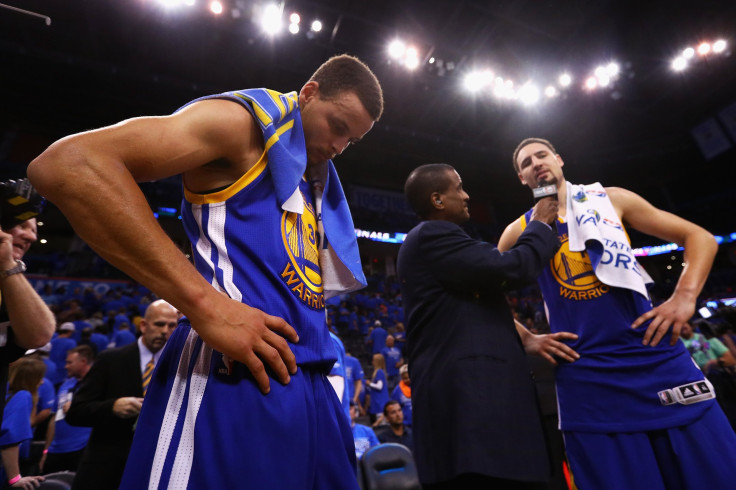Rested vs. Rusty: A 2016 NBA Finals Fatigue Analysis Of Golden State Warriors, Cleveland Cavaliers

Imagine, if you will, the Cleveland Cavaliers win Game 1 of this year's NBA Finals Thursday against the Golden State Warriors. "Ah," the pundits will likely say, "the Warriors, who've played more games these playoffs, are showing signs of fatigue."
Now imagine it's the Warriors who take Game 1. "Ah," the pundits might proffer, "the Cavs, who had a cakewalk to the finals, are showing some rust."
There's an easy narrative in either direction. And while narratives can spin more from talking heads' bluster than from hard truths, there is data showing just how much more wear-and-tear Golden State — who completed a stunning Western Conference finals comeback Monday after being down 3 games to 1 — have suffered. Depending on which side of the rest-vs.-rust argument you favor, the statistics might just back you up.
Using the handy NBA player tracker tool, it's possible to track every minute played by every player, how much footage they've covered, how fast they've moved and countless other arcane metrics. International Business Times sifted through the tracker's playoff data for the Golden State Warriors and Cleveland Cavaliers to investigate stats that might hint at fatigue.
Consider, for instance, the marquee names for the finals: the Warriors' sharpshooting, diminutive NBA MVP Stephen Curry and the Cavs' force-of-nature LeBron James. During the early rounds of the playoffs, Curry was nursing a knee injury and sat out six games. Sure, that equates to extra rest, but it also means each minute played is watched intently and has the potential to be far more damaging. Curry has covered 142,031 feet (nearly 27 miles) in 368 total minutes played throughout the playoffs. The Cavs, meanwhile, have leaned heavily on James, who has covered 175,613 total feet (about 33 miles) in 530 minutes played.
However, Cleveland essentially breezed through the East, and the conference finals were far less intense and took one less game than the seven-game war epic in the West. Nobody ran more than Curry in the Western Conference finals, with the point guard moving 18.6 miles over 257 hard-fought minutes. James meanwhile covered just 13.7 miles over 219 minutes during a series in which four games were blowouts.
All NBA games aren't created equal: In the playoffs the intensity is ramped up. Staring down three elimination games in the conference finals, the Warriors relied heavily on their top players. Curry played 36.7 minutes per game (compared with 34.2 in the regular season), forward Draymond Green played 37.7 minutes per game (34.7 regular season) and shooting guard Klay Thompson played 34.5 minutes per game (33.3 regular season).
The Big 3 for the Cavs mostly saw an uptick in per-game usage, as well, despite playing in a shorter series. James played 36.6 minutes per game in the conference finals (compared with 35.6 in the regular season), forward Kevin Love played 30.2 minutes per game (31.5 regular season), and point guard Kyrie Irving played 35.1 minutes per game (31.5 regular season).
Overall, it's been more of a slog for the Warriors than for the Cavaliers. The Golden State roster has covered nearly 67 more total miles. And those miles were seemingly harder on the body than the miles for the Cavs, who essentially paraded into the conference finals. Golden State's roster average a playing speed of 4.28 mph, while the Cavs' played at an average clip of 4.04 mph. And in the conference finals, where teams really only use their key players, the top nine in their rotation played 223 more total minutes and covered about 20 more total miles than the Cavs' top nine.
Heading into Game 1 of the NBA Finals, Golden State will have just two full days of rest, compared with Cleveland's five. And the data show a marked difference in the playoff experience for the two teams. Now it's just time to figure out if rest or rust wins the day.
© Copyright IBTimes 2025. All rights reserved.






















